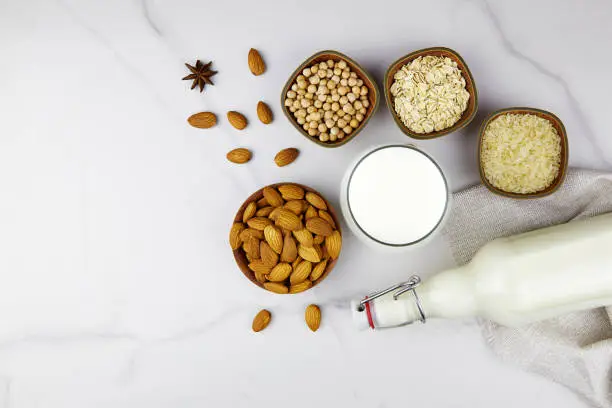If you don’t like dairy products, you don’t have to worry about having weak bones. There are lots of foods with plenty of calcium that don’t have any milk in them.
There are foods that have a lot of calcium, and not all of them have dairy in them. This is good for people who don’t eat dairy, like vegans. Some examples of these foods are chia seeds, almonds, and soy milk.While milk, cheese, and yogurt are the top sources of calcium, there are also many non-dairy foods that have a lot of it. In this article, we’ll talk about 10 Non-Dairy high calcium foods.
Calcium is important for staying healthy. Adults from 19 to 50 years old should have around 1,000 milligrams of calcium each day, as suggested by the National Institutes of Health (NIH) in the United States. You can find this amount of calcium in about three 8-ounce glasses of milk.
Advice for People of Different Ages
Getting enough calcium from non-dairy foods is important for people of all ages. The recommended amount of calcium to have in your diet differs depending on your age group.
For young people aged 9 to 18, it’s good to have around 1,300 milligrams (mg) of calcium every day. Adults who are 70 years old or older should aim for about 1,200 mg each day. For folks aged 19 to 70, having 1,000 mg of calcium a day is recommended, except for women aged 51 to 70, who should try to get 1,200 mg daily.
Although it might need a bit more planning, you can still get enough calcium from non-dairy foods. If it’s hard for you to get the right amount of calcium from food, you can talk to your doctor or a registered dietitian about taking calcium supplements.
Foods with Lots of Calcium That Aren’t Dairy
1.Sunflower Seeds:
A single cup of sunflower seed kernels has about 109 mg of calcium. These seeds also have lots of magnesium, which helps balance calcium in your body and keeps your nerves and muscles healthy. They also contain vitamin E and copper. All these nutrients work together to make your bones strong and flexible and prevent bone loss.
But be careful, some sunflower seeds have added salt that can make your body lose calcium. For the best benefits, choose raw, unsalted seeds. And remember, one serving is about a handful to avoid eating too many calories.
2.Broccoli:
Having one cup of frozen broccoli gives you around 87 mg of calcium. Eating lots of broccoli and other veggies from the same family might lower your chances of getting cancer. Research with animals shows that stuff in broccoli might help prevent cancers like bladder, breast, colon, liver, and stomach cancers. But we’re not sure about humans yet.
3.Sweet Potatoes:
Eating one big sweet potato gives you about 68 mg of calcium. These veggies also have lots of potassium, and vitamins A and C. Vitamin A is like an antioxidant that’s good for your eyes, helps slow down aging effects, and might protect against cancer. Sweet potatoes have low fat and calories and are popular in some places as a side dish.
4.Cheese:
Most cheeses are packed with calcium. Parmesan cheese has the most – about 242 mg in an ounce. Softer cheeses have less calcium. For example, an ounce of Brie cheese only has 52 mg. The calcium in dairy is easier for your body to use than the calcium in plant foods.
Cheese is also a good source of protein. Cottage cheese, for instance, has 23 grams of protein in a cup. Some aged cheeses are low in lactose, which can be easier to digest for people who can’t handle lactose.
Eating dairy might have other good effects on health. Some studies suggest it could lower your risk of heart disease or metabolic syndrome, which is linked to heart disease, stroke, and type 2 diabetes. But remember, full-fat cheese can have a lot of saturated fat and calories. Some kinds of cheese also have a bunch of sodium, which some people should watch out for.
5.Yogurt:
Lots of yogurts also have probiotics, which are helpful bacteria. These bacteria can make your immune system better, take care of your heart, and help you absorb nutrients. One cup of plain yogurt has 23% of the calcium you need in a day. It also has phosphorus, potassium, and vitamins B2 and B12. Low-fat yogurt might have even more calcium – around 34% of what you need in a cup.
Greek yogurt has more protein, but it doesn’t have as much calcium as regular yogurt.
Eating yogurt might help you avoid heart problems and type 2 diabetes, according to some research.
6. Beans and lentils:
Beans and lentils have a lot of good stuff like fiber, protein, and small nutrients like iron, zinc, folate, magnesium, and potassium.
Some types of beans also have a good amount of calcium. Winged beans, for example, have 244 mg of calcium in a cup. White beans have 12% of the calcium you need in a cup. Other kinds of beans and lentils have less calcium, like around 3-4% of what you need in a cup.
Eating beans might help lower bad cholesterol and reduce your risk of getting type 2 diabetes.
7. Leafy greens:
Leafy green veggies are super healthy, and some of them have a lot of calcium.
Collard greens, spinach, and kale are some examples of these vegetables.
One cup of cooked collard greens has 268 mg of calcium, which is about 21% of what you need in a day.
But be aware, some greens like spinach have something called oxalates that stop your body from using calcium. So even though spinach has calcium, it’s not as good at giving you calcium as other greens like kale and collard greens, which don’t have much oxalates.
8. Kale:
Eating just 2 cups of raw chopped kale can give you about 180 mg of calcium. Kale is a leafy green that’s really good for you, and it’s like a cousin to broccoli.
Kale has things called antioxidants that help keep your cells healthy. It’s also low in calories, which is good if you want to eat healthy. You can put chopped kale in a salad, or you can cook it by sautéing or steaming it.
9. Tofu:
Tofu is another way to get calcium, and it’s usually really good for that. But the amount of calcium can be different depending on how firm the tofu is and what brand you buy. It can be between 275 and 861 mg in half a cup.
To get the calcium benefits, make sure to read the labels and pick tofu that has something called calcium salt in it. This helps it get firm.
10. Almonds:
Out of all the nuts, almonds have the most calcium. Just a small handful of almonds, which is about 23 nuts, gives you 6% of the calcium you need in a day.
Almonds also have 3.5 grams of fiber in that small amount, which is good for your body. They also have healthy fats and protein, and they’re full of good stuff like magnesium, manganese, and vitamin E.
Eating almonds might even help your blood pressure, body fat, and lower the risk of some diseases.


